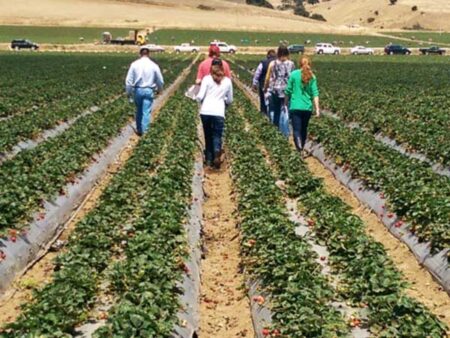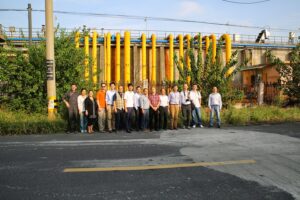Ceres works with capital market leaders to integrate sustainability and climate risks into the perspectives of companies, investors, and policymakers. The organization works to move capital, influence systems and strengthen policies to drive large-scale economic transformation towards a just and sustainable future.
Mindy Lubber of Ceres spoke with Lissa Harris on July 31, 2023. Click here to read the full conversation with insights highlighted.
Lissa Harris: Could you please start out by introducing yourself and tell me a little bit about the problem that you’re working on?
Mindy Lubber: I’m Mindy Lubber. I’m the CEO of Ceres. We are about a $45 million NGO with 230 people. Largely headquartered in Boston, but with offices in Washington and San Francisco. Our mission is global, so it’s not locked into the four corners of the United States.
We work to integrate sustainability into capital markets. To turn that phrase into English, we work to make sure that companies from the boardroom to the supply chain, investors as they think about their portfolio and their ownership of companies in their portfolios, regulators on federal financial issues like the SEC and the Federal Reserve, as well as policymakers at the state and federal levels are integrating climate risk as the priority into all that they do.
That’s largely the problem and the mission, but I would say the other problem we’re working on is we are at a moment in time, and this is probably not where you want to go, but this woke capitalism, culture wars, anti ESG [Environmental, social, and governance]. Nobody knows what ESG means. We do since we’ve been in this space for 30 years. For that to have become a politicized imperative of the right. And again, we’re not meant to be partisan, we’re a C3. But we have 20 years of just straight up integrating sustainability into our capital markets, so capital markets are saying, yeah, we’ve got to look at the risk of climate change.
To have hit this wall where there’s a body of people saying, “You can’t do that, you shouldn’t do that, you won’t do that.” And look, they’re doing it around all the values we believe in. In our case, it’s environmental, social and governance issues. But we’re as concerned about the culture wars, about DEI [diversity, equity and inclusion] and Choice and LBGQT rights. Just everything they’re trying to turn back the hands of time on. I’m having to spend millions of dollars fighting this anti ESG thing, which is just revolting and preposterous. But that’s probably not the problem you want to discuss today.
Lissa Harris: I think it’s relevant because it’s something that’s interfering with your work. It’s something that’s a challenge to your mission. It’s relevant to talk about in terms of the logistics of how problems get solved. But we can get back to that. I was hoping you could talk a little bit about who the people are, the entities that you’re serving directly, and how you engage with them? Who are the main beneficiaries of your work and the avenues that you use to do that?
Mindy Lubber: Yep. Well, again, I’ll go back to these words that don’t mean that much, but to me they mean a lot, integrating sustainability into capital markets. For decades, caring about environmental and social issues were just for the bleeding hearts, us lefties or progressives or somehow it had nothing to do with the economy. We spent the last 18, nearly 20 years making the case in our capacity as thought leaders or think tanks, that if you look at climate changes, it is a massive financial risk and ought to be treated like any other financial risk. Or in the world of finance, it’s a material risk. So you’ll hear me say material risk a hundred times until you want to throw up and tell me enough when you have heard it enough.
If it’s the SEC, if they care about currency risk and inflation risk and monetary risk and natural resource depletion risk, they ought to care about climate risk because it has risen to the level of materiality. It’s costing us billions and billions of dollars a year here alone, tens of billions of dollars around the world. That should be part of their mission to look at risks and opportunities. For every company, for almost every sector of our economy, whether you run farms, whether you run apparel companies and you need your cotton crop, whether you run auto companies or utility companies or steel companies, every one of them have implications from climate change. And if they’re not dealing with them, they’re not well managed, they’re not looking at the real risks. Companies and boards of directors of companies have to analyze and act on risk.
We work directly with companies from their boardroom down through their supply chain to share best practices and push them to do more. We are not consultants, we’re advocates, but a different kind of advocate to them. We’re not standing on street corners with signs or suing them. I did that in prior careers for many decades. We’re working with them. But again, not as consultants. Whereas a consultant, you go in, they pay you, here’s $50,000, tell us how to do this. And you give them your report and maybe they do it and maybe they don’t. I mean, we expect to have long-term relationships where we push them to do more and more and better and better. We work with about 120 companies.
With investors it’s the same thing. If they’re ignoring the risk of climate or water or frankly diversity or many other things that we care about, then they’re missing risks that they should be looking at as fiduciaries. So we work with investors, 220 in the US and 700 globally, to integrate climate risk into how they analyze companies and what the opportunities are and what they invest in and what they don’t invest in. Then, we work at a regulatory level and a policy level where there’s substantial value add. When I walk the halls of Congress or state legislatures, they could easily say I’m just one more advocate. And I am just one more advocate. But when I bring 10 CEOs of the biggest banks or steel companies or utility companies, they’ll listen in a different way. It’ll take it out of the total partisanship.
That’s our job. Make these real economic issues, not just because we’re putting value on things because we care about them. There are many things I care about that I can’t make the economic case for. Climate is the poster child for economic implications and imploding our economy as well as, God forbid we should worry about our kids’ future or humanity. Even if we want to take those silly things out of the discussion, it’ll implode our economy. It will be bigger than the subprime meltdown by far as the financial and climatic changes continue to grow.
Lissa Harris: Are you working with the insurance sector on that? Or what sectors do you work with?
Mindy Lubber: We work with about eight sectors. They’re either high emitting sectors like autos, utilities, real estate, steel, cement. Or they’re highly leveraged sectors like banks, financial services and insurers. We work with all of them, have members do lots of convenings. We don’t go out far away to work with our buddies at Ben and Jerry’s or Seventh Generation. I mean, we talk to them all the time, but they’re moving. They don’t need us. We work with really complicated players. And it is hard. We want to make sure whatever claims they’re making are grounded in science, that they are transparent, and are showing when they’re getting real results. Even when we get that, the goals are never audacious enough. They are certainly not audacious enough to keep up with the scope and the magnitude of the problem.
Companies are getting, some people call it green hushing. They’re getting more timid. Companies and investors that have been acting tell us they’re going to continue to act, but don’t ask me to stand up and speak out and tell the world that we’re leaders on sustainability, that is no longer a good thing to do. Everybody’s afraid they’re going to be Disneyed and have tax incentives taken away or whatever’s going on in the state of Florida, none of which is good.
So this is a particularly tough time because we have had growth in sustainable investing and in businesses moving. And again, put it in context, none of them were moving enough, but we are inching away every year, getting more and more pickup. There’s been a chilling impact of this $300 million fossil fuel far right, Leonard Leno or whatever the guy is who did the Supreme Court Federalist papers. Put a huge amount of money into suggesting capital markets shouldn’t be allowed to consider environmental and social issues. Here’s the total free marketeers trying to regulate the market.
That’s what we do. We try to move capital markets to address sustainability. It’s gotten more complicated at the moment because of the pernicious political environment we’re living in. And we are not unique, it’s not only about sustainability. It doesn’t make it less painful. In fact, we want to make sure we’re standing with others who are seeing attacks in DEI shouldn’t be the case or choice shouldn’t be allowed or anything else we’re seeing as we go through our days. It’s pretty shocking what the divide is as it gets more and more diverse.
Lissa Harris: What makes your approach distinctive from other organizations that are working in a similar space?
Mindy Lubber: It really is moving capital market players. I’ve spent 40 years now trying to move climate or sustainability issues. I’ve worked for grassroots environmental groups through litigation groups. I ran a small green investment firm. I ran the EPA regional office for six New England states as the chief regulator and litigator. And they’re all different sets of tactics and strategies to get at the same thing.
With all humility, because anyone who’s not humble in this world and thinks they could do it alone. You don’t know what’s going to break a system or crack it. You need 25 things being thrown at the wall and something’s going to work and it’s going to work just because it does, because of timing. Many years moving capital market players has been really impactful as part of a bigger ecosystem, as part of an ecosystem of lawsuits and grassroots organizing and think tanks. And who knows what will be the thing that cracks the system in the end. I don’t know if there will be one thing. There will be new scientific imperatives. There will be storms and things that change our reality, insurance companies. But what’s unique about us is making the economic case and bringing the economic actors into the debate, including the regulatory and policy debate.
Lissa Harris: Can you share an example that illustrates the impact of the work that you have? Have you got a real success story that really shows what you do?
Mindy Lubber: During the IRA, the Inflation Reduction Act, $169 billion, enough to be really transformative, 40% of it going to frontline communities. Finally, let’s deal with environmental racism and justice. We brought private sector leaders into that debate early and often. And we got phone calls from the White House every week saying, “You really need to help us in Arizona, in this state. We need private sector leaders. We need support. Or we need to bring another hundred businesses and investors into DC.” And they acknowledged it publicly. They had me at the bill signing of the IRA as well as the infrastructure $3 trillion rule. They said it made a difference to have private sector leaders fighting with us as much as environmentalists. And again, they’re not more important, but they’re part of the ecosystem.
We had enough of a base and a bench to be able to bring people in and call them up and do an event in Colorado or Arizona on short notice. We’re now trying to show the potential and the capability of the Inflation Reduction Act and what it means. So that’s an example. I could come up with lots of other things. I mean, we ran investor summits on climate risk, there was never an investment event. This was 2004. Climate change was just a straight environmental science issue. And we turned it into an investment issue and were able to bring CEOs and the leadership of every major financial firm to come and learn and speak. And every year we brought them up a little bit on knowledge as well as willingness to act.
Lissa Harris: What are the teachable lessons here for other people working in this space? What are the insights that they can draw from the success that you’ve had? The passage of the IRA is pretty monumental after decades of Congress not passing much of any impactful climate legislation. What’s the lesson here for other groups?
Mindy Lubber: Every group has their mission and mandate, and I don’t want to tell them what to do. We were just at a convening of 50, 60 organizations around fighting back on this anti ESG stuff. We call it freedom to invest. We’ve tried to spin the narrative into something proactive and positive. We were sort of a middle of the road group, even though we’re advocates who pushed for change, we just work in a different space, but towards the same end.
I think for the IRA’s purpose, the presumption was that big companies were all bad, grassroots stuff was all good. We once again showed that’s not the case. Now, if I were a grassroots group, there’s plenty of reason to believe that’s the case, meaning that all these companies are a bit full of inflating what they’re doing. It’s not a black and white issue. But politically, particularly in the culture war we’re in, and to me it feels like a civil war, we’re going to have to find a way to reach beyond our closest colleagues and friends. And I think the IRA bringing hundreds of investors and companies into the debate helped a lot.
Now, I support in every way organizations that are showing up at the CEO’s home with a sign that says, “You’re killing us.” I just think collectively all those things start working together. And it’s not what we do. A lot of it is driven off of economics. Again, when we’re living in a world of facts and science, the economy is mightily important. And we’re going to keep making the economic case of if there is no economy, there’s also no humanity. If we don’t deal with climate, if we don’t deal with water shortages – I mean the world will be 30% short of the water it needs to operate by 2030 and 25% in four years. It impacts every business.
We’ll make the business case, the case of the economy, farm workers laid off, food prices going up. Women in the developing world, just going from carrying water for four hours to six hours, the pernicious impact of it. But we continue to make the case. I was doing a training at the GAP’s board of directors when their cotton crop died due to drought three years ago. That was a 3% hit to their share value. That’s the world they understand, the language. That’s how we move companies and their boards. Our strength is going to the economics of it all given the strength of the economy and how it moves things.
Lissa Harris: As an organization, how do you measure success? What are the metrics? What’s the evidence that you’re making progress?
Mindy Lubber: I’ll give you some anecdotal and some less. I mean, 10 or 15 years ago when we would try to get a meeting with a CEO or board of directors about sustainability or climate change, people rolled their eyes. “Isn’t that cute? You go talk to our environmental intern and you’ll get the position of our company.” Now we are so far beyond that. Now, companies do know logically, and that doesn’t mean oil companies who know but aren’t going to support this, that climate is something they have to address and they have to address it as part of their business imperative. Their board has a duty to address it. There’s regulatory issues surrounding that.
Nobody is rolling their eyes anymore. Everybody agrees that this is a capital markets issue that matters. Is it only us that moved all these companies? No. Is it our campaigns where the owners of companies meet their investors who make up our theory of change? If they’re not going to listen to us or the economics, they’ll have to listen to their owners. That’s our 220 investor members who will come to us with a company and say, “You got to address climate risk as a financial matter.”
Objectively speaking, we’ve gone from six shareholder resolutions to 197 on climate. They say different things. The average vote used to be 4%, now it’s 34%. The average Fortune 500 company who made a commitment to climate was 5%. Now it’s 65%. Again, we’ve got an obligation to make sure those commitments are real, grounded in fact, accountable, transparent, and have short, medium, and long-term goals. But even five years ago, we didn’t have that.
So many things have changed. I don’t attribute them all to Ceres. It’s all part of that ecosystem I talked about. But it is moving forward with a little bit of a detour this past year. A year ago, I was at a briefing for Brian Moynihan, who’s the chairman of Bank of America, and the woman who’s the head of the Cook Report, which is a political consulting firm and publishes a lot of data facts, she said, “Anti ESG,” or whatever term she used, “Was going to be a top three priority for Republicans at the presidential, federal and state level.”
I said, she’s smart, but she’s wrong. I’ve been in this for a long time. I’ve done presidential campaigns, I’ve done law, I’ve done politics. No way, that’s going to be the case. Well, it shows you how smart I was, proven a hundred percent wrong. Now I have Jim Jordan sending me letters, subpoenaing me to deliver every document we’ve ever written on investor pressure. We just delivered 70,000 documents, literally four lawyers working around the clock in one of the biggest law firms in Boston, who thank goodness were working pro bono. But I was wrong. I was wrong a year ago when I thought that they were not going to get any traction or be serious about this.
Lissa Harris: Every social innovator learns as much from things that don’t work as things that do. And I’m wondering if there’s something you can look at in your tactics, either around this ESG stuff that’s come up recently or more generally in your work, that you tried something and it just did not work out.
Mindy Lubber: Great question. There are many people in the social and environmental investing community that want to compare it and build on the model of the South African divestment movement because that was highly successful. That was built and it’s great, and I’ve read every book on it. That was built as a social movement and in the end, after lots of years of struggle, the divestment movement in South Africa had a profound impact on bringing down the government of South Africa.
People like to compare the climate investor campaign to the divestment movement. And as much as I would like to, it doesn’t work. If we’re going to take a logical frame of action on climate because it’s a financial matter, not because it’s the right thing to do from a social perspective, but because the financial implications of ignoring climate will do us in as a world economy, as a United States economy and so on.
So there were times when we fudged on whether we were just about getting investors to pressure companies or whether we were calling for divestment from all fossil fuels. Which over the long term, over 20 years, 30 years, I could make the economic case. There’s no way that makes sense. But over the short term, it’s a lot harder of an argument to make. Since the Ukraine war, the oil and gas companies have made more money, the zeros go on and on and on and on.
So when we tried to make the divestment case, the pushback from even our most progressive public pension funds sort of had to remind us, and rightfully so, if we wanted to stake out this ground. Not because calling for divestment is bad, but it takes away from this as a straight economics issue. And we took abuse from our colleagues on the left who said, “We’re just not pushing hard enough.” And we weren’t meaning to not push hard enough, but we were trying to make this not a social issue campaign, but an economics issue campaign. Otherwise it was very hard to keep companies and investors in the tent. I think knowing your wheelhouse and where you fit and staying pretty systematic and disciplined is important. When you get out of that, you end up getting wound up in different buckets of trouble.
I’m not an economist, I’m a lawyer, but I can make the economic case on why getting out of fossil fuels is the right thing to do economically. Because at some point there will be policy. It may very well be too late to solve this problem the way we need to. But the oil and gas companies are going to have to stand down in the amount of double and tripling how much they’re pumping out of the ground and the amount of coal that we’re shipping to China and to India and to Southeast Asia and parts of Africa. But at the moment, it’s hard to make that case over the short term. I mean, we make it and we’ll continue to make it, but the more we go way left to divestment, the more we lose our economic teeth. So
Lissa Harris: Is it fair to say it’s not that divestment or centering your work around social issues is necessarily a bad tactic. But there needs to be an organization that is disciplined about not doing that?
Mindy Lubber: Yeah, it’s great to address it. But if we’re going to say we’re a think tank and a do tank and an advocacy group that deals with the economics of integrating climate, then we need to stay grounded in the economics. I mean, I’m on the advisory board to the chairman of Morgan Stanley and Wells Fargo and B of A. And they actually listen to me. I have a seat at the table. I get invited. If I were calling for divestment based on it’s the right thing because these oil companies are the biggest schmucks in the world, I wouldn’t be there.
And if, again, we’re trying to get to the same result, there are just a million different tactics and strategies and it’s hard. We’ve been doing a lot of focus groups and polling on this anti ESG thing. We win on climate risk. We win in some kind of debates, but that doesn’t mean we’ll win because they’ll spend $300 million and we’ll raise $3 million or whatever. Although I do think we’ll win in the end. Social issues fail in that realm. So it breaks my heart, and it doesn’t mean we’ll fight less for social issues, but it means they are not working in moving the debate on state legislation and federal legislation. So I could do what my heart tells me and talk nonstop about climate risk and equity risk and just all the issues that I care about where we could focus on climate, help others focus on some of the other issues. But it takes a brazen discipline and sometimes heartbreaking discipline to do that.
It doesn’t mean we’re just totally calculating. There are times when we need to all stand up with each other or we will all go down in this pernicious political environment. But these are very special times. And it was around Nazism, they came for the socialists. We didn’t stand up for them. We were socialists. They came for somebody else. We didn’t stand up for them. In the end, we’re going to have to stand up together and for each other, whether it’s choice, whether it’s gay, whether it’s climate, whether it’s equity, black and brown partners. And there are many places where we’ll do that. But on economics, we’ve tried to stay the course.
Lissa Harris: Taking funding aside, because funding is a challenge for everyone in facing any social problem. But is the anti ESG movement at this point the biggest challenge that you haven’t been able to crack? Are there other forces or challenges that you’re facing at scale in that way that are problems that you really don’t see your way out of yet?
Mindy Lubber: The power and the economic strength of fossil fuel companies. The top five or six are bigger than almost every country, US, China, a handful of others, the G7 maybe not. But the power of that wealth and the need to hold on to the status quo. I used to think, well, these companies are really smart. They should just start transforming to renewable energy companies. That’s not realistic. I’ve learned that. I’ve talked to them. I’ve studied it. As obnoxious CEOs or leadership of those companies have said to me, “Asking me to become a renewable energy company is like asking me to sell women’s underwear. We don’t know how to do it. It’s not what we do. Just because it’s within the energy field, it has nothing to do with our expertise, our strength, our patents, our money, our resources. We drill. That’s what we do. Or we dig for coal. That’s what we do. We don’t make windmills. We don’t do this. It’s a foreign world to us.” So you’re talking about companies that are making hundreds of billions of dollars. People don’t let go of that easily.
Lissa Harris: Can you be a little more specific about how you’re working to advance systems level change in your field through partnerships, through policy, through different approaches?
Mindy Lubber: There’s probably 50 I could talk about. And 50 means nothing. So let me pull out one or two. The first one I would say is the SEC, the Securities and Exchange Commission. When we started lobbying them 10 years ago to integrate climate risk, I mean their job was to make sure that investors who are investing in publicly traded companies disclose their risk and their opportunity, but risk really. No company ever thought about disclosing their climate risk. They disclose lots of risks as I talked about – inflation risk, currency risk, reputational risk. They’re being sued. Their competition is growing. The list goes on and on. Climate risk is bigger than most of those risks financially, but companies don’t think about it. They want to dismiss it as an environmental issue, not a real economic issue. They don’t know how to do it. What does that mean? What does it look like? So they fight it like it’s poison.
Even though it really isn’t even saying you’ve got to reduce your footprint, all it says is you have to be transparent. You have to analyze that risk and you have to tell your investors or potential investors what that risk looks like. It’s taken us 10 years to get that strongly considered. I wish I could tell you it’s done. The present SEC, who we work with, some anti Ceres report just came out from the right wing. And they said, one of the things people should know is that we’ve met more with the SEC than anybody. I don’t know what that tells you. Maybe we’re in cahoots or of course it means that we’re just doing our jobs.
The SEC put out a 507 page draft rule. We worked closely with them. It was pretty strong and comprehensive. That rule got more comments than Dodd-Frank. There’s 16,419 comments supporting and against it. A lot of us love it, but we can do this and we can do that and we can add this and we can take out that. And a final rule will come out. It was supposed to come out this past spring, but now we’re told it will come out in December. And who knows.
As things get more political, it’s harder to put these rules out. On the other hand, they should just get it out and get it over with. Once they put it out, it’ll be litigated, so it’s not like it’s clear sailing. But that’s a great system change. It then forces every publicly traded company to look at their risk, to analyze it, to do the homework that it takes to consider it and what they’re going to do about it. It requires every investor to understand climate risk, what it looks like, what they’re expecting, what they’ll ask the companies in their portfolios to do as part of their ownership of companies.
To be trite, you can’t manage what you can’t measure. And so you have to measure your risk and you have to show it and make it public. And I think there will be an SEC rule that passes. I think we will have had a lot to do with it. But everything gets turned upside down in this political moment. It may be that as things get more and more divided, even the quasi-independent regulators put out less and less.
As I said, every rule that matters is being litigated. All the major EPA rules, even from the day when I ran part of the EPA and regulation and the legal, we didn’t expect every rule to be challenged. But now everybody knows they’ll bring it up to the Supreme Court and the Supreme Court will do what they’ve done on some big environmental cases, let alone other small things like Dobbs and affirmative action. So now we’re in a world where every regulation will be litigated. We’re already preparing a legal brief, friend of the court. But that’s an example of systems change.
Lissa Harris: Are you involved at the state level too? I know my own state, New York, fairly recently put out new guidance to insurers that they have to pay attention to climate risk. So I’m wondering how the state battlefields are for you.
Mindy Lubber: Yep, we’re in about 16 states. On regulatory issues like that, we’ve got a team of lawyers working on that. New York is very important because 93% of insurers do business there. They don’t have to be domiciled in New York, they just have to do business in New York. But the language was pretty weak. We’re trying to strengthen that. Insurance is one of the most perplexing things you could imagine because we’ve been saying for 10 years insurers are going to be impacted incredibly. I mean, look what happened in California last month with insurers just pulling out of the entire state. And we will see more and more of that. That makes us insurance companies because the states get involved as the insurers of last resort.
There are two issues with the insurance regulators, and we’re dealing with that. We’ve got a big presence. We’re giving one of the keynotes at the National Association of Insurance Commissioners, which will happen in Seattle next month and a few others. Insurers that are elected don’t want to be in a position to raise rates. And if you show the real risk from insurance, they’re going to raise rates. Insurance commissioners that are appointed, their bosses don’t want to raise rates. We’re trying to find the right mix. There are a series of enterprises, the net zero asset managers and net zero asset owners and net zero bankers.
We, as part of the UN and some other global organizations, were part of net zero insurers. They fell apart over the last month because of this anti-ESG, being told by 21 attorneys generals that they were in violation of antitrust laws for even talking to each other about climate risk. So we’re a little nervous about them moving backwards. We’re hoping not. They’re all saying to us behind closed doors, “Now we’re going to all do the same thing. We’re just not going to subject ourselves to these claims of antitrust.” The claims are nonsense, but they make it hard. The attorneys general from about 19 of the most conservative states have written letters to every asset manager, every asset owner, every insurer saying, “You can’t consider climate risk. And doing it through these initiatives that Ceres is part of and others are part of is just a straight violation of antitrust.” They don’t have an argument, but they make a strong bunch of words hang together.
Columbia Law School just put out a piece last Friday saying this is the biggest crock of shit in the world. But it doesn’t matter. It still scares companies. And then their general counsels get involved and their boards get involved, which is leading to this green hushing, a term I don’t love. But all these companies and investors are saying, “Now look, we’re going to do what you want, Mindy. We promise, and you could have access to this and that, but we’re not telling anyone. We are just not standing up and shouting out our triumphs on sustainability the way they did last year and the year before and the year before.” That’s having a chilling impact. That’s not helpful.
Lissa Harris: What do you think is most needed from your partners, from other actors in this space to push that systems change forward?
Mindy Lubber: Stand up and speak up. It’s one thing to say you’re going to keep doing the right thing, but until you stand up and speak out and say these things are just bad on all fronts. They’re bad economics. They’re bad policies. Look, when companies stood up originally for certain things, like gay marriage, when companies had the nerve, it made a difference. They’ve got to speak up on all of what’s going on right now because it’s going to impact their employees and them as companies, and you can only run away from it for so long.
Lissa Harris: Is there an example of somebody, some company, that you think is doing well on the climate front or on the anti ESG front?
Mindy Lubber: We have 350 companies on our webpage who are supporting what we’re doing and 120 business school professors. We’ve always been able to get the biggest players, the BlackRock, the Apples. None of them want to stand up and speak out. I mean, this anti ESG campaign went after Larry Fink personally as well as BlackRock. BlackRock being the largest money management firm, $11.5 trillion dollars in assets. Larry wrote some of the strongest shareholder letters over the last three years on climate in particular. They’ve attacked him, they’ve attacked BlackRock and they’ve really gone underground. My mission is to try and get more of the big players to stand up and speak out.
Lissa Harris: How do you see your work evolving over the next five years?
Mindy Lubber: If in fact we get through this crazy election and we will get through it hopefully on the right side of history. And these culture wars are not working, I think we could turn it around and get our pace back and our tempo and momentum back. I don’t even want to say if something else happens, because I don’t know what to tell you if Trump were to get in again. The consequences now, politically, are so extraordinary.
Lissa Harris: We’ve covered a lot of ground. And your work is really broad. Is there anything that we didn’t get to that you think is really important to highlight in this? Either that shows your success or that shows a challenge or?
Mindy Lubber: What gives me hope is some of the progress we’ve made. Look, companies didn’t think climate had anything to do with their space or who they were 15 years ago. Now they all know it is part of their success, their future, their failures. That if we don’t address climate and water, we can’t build an economy. So now is the time to turn it around. We’ve made progress in bringing the footprint down some, but we get to a point of no return. We have to keep going in the coming down direction and not let things start moving upwards again. There’s a lot of progress we’re making and we ought to just keep at it.
Lissa Harris: Thank you so much for talking with me today about your work and your insights.
Click here to read the full conversation with insights highlighted.
Lissa Harris is a freelance reporter and science writer (MIT ’08) based in the Catskills of upstate New York. She currently writes about climate, energy, and environment issues from a local perspective for the Albany Times Union, her own Substack newsletter, and various other digital and print publications.
* This interview has been edited and condensed.
Learn about other organizations working on economic social innovations.







